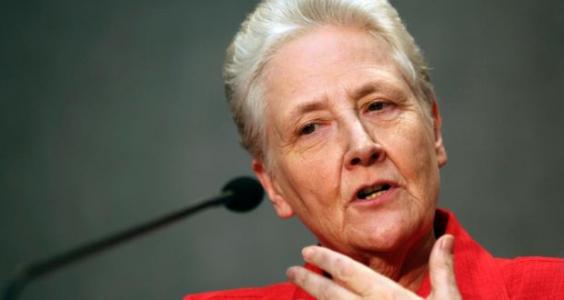Michael Higgins
It is a story of two Maries and their personal courage over against intransigent authority that is as much inspiring as it is dispiriting.
Marie-Julienne Farrington, now deceased, was a Sister of Notre Dame de Namur, its international leader, a university president’s advisor on spiritual matters, a French translator and a social activist. She was also a person of uncommon bravery.
I was thinking of her recently — we worked together for years at Sacred Heart University in Connecticut — when I read of the recent apology issued by Pope Francis following his meeting with the controversial President of Rwanda, Paul Kagame.
The apology, long sought after by the Rwandan government, consisted of a formal acknowledgement of the Catholic Church’s failures during the 1994 Rwandan genocide. Like Belgium, the United States and the United Nations, the Vatican came in for heavy criticism for its complicity or inaction during the bloody slaughter that claimed over 800,000 lives.
Indifference
The Catholic Church in Rwanda (the majority faith by far of the population) suffered the loss of countless Church workers, professed religious, and clergy – including the Archbishop of Kigali Vincent Nsengiyumva – so it is by no means a matter of institutional indifference. But there were also instances where clergy succumbed to tribal identity and jettisoned the overriding Gospel imperative to love one’s neighbours rather than to massacre them.
It is these specific failures that Pope Francis addresses in his apology.
For Marie-Julienne Farrington, apologies and strategic considerations were immaterial. Forbidden by both American and Belgian authorities to travel to Rwanda, she disobeyed them, rented a car in Burundi, and crossed over the border to stand in solidarity with her threatened sisters, Hutu and Tutsi alike.
Thugs
At one point, she was halted by drug-crazed Interhawame thugs brandishing blood-laced machetes, but the diminutive nun stared them down. They let her pass.
Farrington knew Kagame, befriended the former Canadian general and senator Romeo Dallaire (someone who was only too intimately familiar with the Rwanda tragedy), and placed herself in danger as a religious leader because her place was to be with the suffering and the intimidated.
By contrast, Dallaire once told me, the Vatican’s ambassador was one of the first on a plane leaving the city once the bloodlust was unleashed.
Marie Collins, the recently-resigned clerical sex abuse survivor whose position on the Vatican Commission for the Protection of Minors was heralded as unprecedented and brilliant, is also a woman whose personal integrity was put on the line and who responded with the strength of her beliefs.
Dismayed by what she considered the stalling and stubborn resistance to change in the Vatican regarding various protocols for episcopal accountability, for the Vatican’s frequent demonstrations of bad faith concerning the implementation of policies approved by Francis (at least in principle), and for the adamant refusal of appropriate Vatican officials to respond to each and every letter from a victim apologising for their suffering and at least acknowledging receipt of the letter, prompted her, in the end, to tender her resignation.
Survivor
A survivor of abuse, an articulate spokesperson and advocate for justice for all survivors, and a committed Catholic who differentiates between depraved or corrupt representatives of the Church and the Church itself, Collins was the humanising lay face of the commission (a male survivor, Peter Saunders, lost the trust of the commission earlier and was suspended from it), leaving the Baroness Sheila Hollins, a British psychiatrist, the remaining high profile lay presence.
In both instances, the two Maries stood firm in their values and have edified us with their personal integrity.
Neither ecclesial renegades nor disaffected people of faith, their witness is yet another reminder why the continued exclusion of women from positions of serious leadership and ministry in the Catholic Church speaks to a poverty of vision and imagination that diminishes us all.
*Michael W. Higgins is Distinguished Professor of Catholic Thought, Sacred Heart University, Fairfield, CT, an author and public broadcaster.


 Mags Gargan
Mags Gargan Marie Collins
Marie Collins 